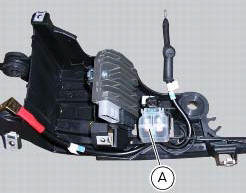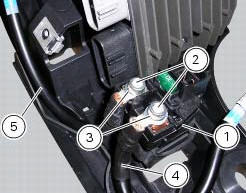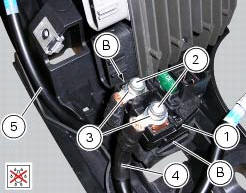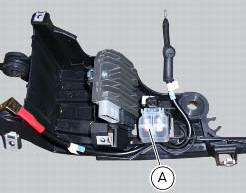
Ducati Diavel Service Manual: Solenoid starter

Remove the protection cover (a).

Undo the screws (2), taking care to collect the spring washers (3).
Remove the starter motor-solenoid cable (4) and the solenoid-battery cable (5).
Remove the starter solenoid (1) sliding it upwards.

Checking operation of the starter solenoid
To check the solenoid starter proceed as indicated in sect. 6 - 8, "Starter motor relay".
Ensure that the terminals are not oxidised.
Position the solenoid-starter motor cable (4) and the solenoid-battery cable (5) on the solenoid terminals.
Start the screws (2) fitting the spring washers (3).
Tighten the screws (2) to a torque of 4 nm +/- 10% (sect. 3 - 3, Frame torque settings).
Apply waterproof spray in the area of the screws.
Fix the starter solenoid (1) to the battery support inserting it in the tongues (b).

Refit the protection cover (a) inserting it on the solenoid starter guides until it engages with the tabs on both sides of the solenoid starter.


 Starter motor
Starter motor
Power:
0.7 Kw/12 v
Direction of rotation:
counter clockwise viewed from power take-off side.
The starter motor is highly compact and reliable and therefore rarely gives
any type of problem. ...
Other materials:
Vehicle pre-delivery
Transport packaging integrity check (if required);
Removal from the transport packaging (if required);
Motorcycle integrity check;
Check of the supplied kit completeness (refer to the parts list supplied
together with the bike packaging);
Only if the bike is supplied in a crate: handle ...
Removal of the throttle twistgrip
Peel back the rubber sleeve (a) protecting the throttle control cables.
Undo the screws (b) of the throttle grip (6) and open the command.
Disconnect the throttle grip cables (10) by unhooking the cable ends (c) from
their seats.
Remove the throttle twistgrip (6) from the handlebar.
...
Removal of the gear selector lever
Unscrew and remove the fixing screws (18) and (20) of the complete gear
selector lever (21) and collect the spacer (19).
Remove the gearchange mechanism complete with the shaft, spring, and stop plate.
Important
Visually inspect the gear selector claw (14) for wear, particularly aroun ...
